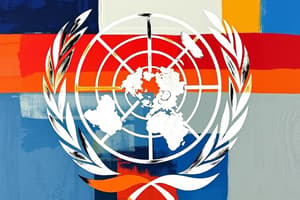Podcast
Questions and Answers
What type of law holds a company and its officers and directors liable for damages caused by a product?
What type of law holds a company and its officers and directors liable for damages caused by a product?
- Tort law (correct)
- Labor law
- Criminal law
- Contract law
What is the term for an injury inflicted on another person, either intentionally or negligently?
What is the term for an injury inflicted on another person, either intentionally or negligently?
- Damages
- Tort (correct)
- Liability
- Negligence
What is the purpose of the Foreign Corrupt Practices Act (FCPA)?
What is the purpose of the Foreign Corrupt Practices Act (FCPA)?
- To encourage international trade
- To prohibit payments to foreign government officials (correct)
- To regulate foreign trade practices
- To promote economic development
What is the concern regarding the WTO's involvement in national labeling laws?
What is the concern regarding the WTO's involvement in national labeling laws?
What type of law holds the designer or manufacturer liable for damages caused by a product without the need for a plaintiff to prove negligence?
What type of law holds the designer or manufacturer liable for damages caused by a product without the need for a plaintiff to prove negligence?
What is a concern for employees working abroad?
What is a concern for employees working abroad?
What is the term for government restrictions on the quantity of a product that can be imported?
What is the term for government restrictions on the quantity of a product that can be imported?
What is the purpose of packaging and language requirements?
What is the purpose of packaging and language requirements?
What is the concern regarding the science behind local laws and regulations?
What is the concern regarding the science behind local laws and regulations?
What is the term for a restriction on the quantity of a product that can be exported?
What is the term for a restriction on the quantity of a product that can be exported?
Flashcards are hidden until you start studying
Study Notes
Intellectual Property Rights
- Intellectual property refers to a creative work or invention that is protectable by patents, trademarks, trade names, copyrights, and trade secrets.
- TRIPS and WIPO work to standardize the intellectual property system.
- Patents are government grants that give the inventor of a product or process the exclusive right to manufacture, exploit, use, and sell that invention or process.
- Country-specific laws vary widely, and patent trolls and pirates challenge the patent system.
- Figure 6.2 shows intellectual property protection rankings for selected countries in 2020.
Patents and Trademarks
- Trademarks are shapes, colors, designs, phrases, abbreviations, or sounds used by merchants or manufacturers to designate and differentiate their products.
- Trademarks vary from country to country, and the Madrid Agreement of 1891 is administered by WIPO.
- The distinctive Burberry Plaid is trademark-protected.
Trade Names and Copyrights
- Trade names are names used by merchants or manufacturers to designate and differentiate their products.
- Trade names are protected by WIPO and TRIPS.
- Examples of trade names include Taco Bell and Pizza Hut for Yum! Brands, Inc.
- Copyrights are exclusive legal rights of authors, composers, creators of software, playwrights, artists, and publishers to publish and dispose of their work.
- Copyrights protect tangible property, and the 2019 Directive on Copyright in the Digital Single Market is an example.
Trade Secrets and Incoterms
- Trade secrets are any information that a business wants to hold confidential, including formulas, processes, patterns, and designs.
- Trade secrets are the most common type of IP protection.
- Incoterms are predefined commercial terms established by the International Chamber of Commerce, including FAS (free alongside ship-port of call), CIF (cost, insurance, freight-foreign port), and CFR (cost and freight-foreign port).
Standardizing Laws Around the World
- Competition laws, also known as antitrust laws, prevent inappropriately large concentrations of power and its abuse through price-fixing, market sharing, and monopolies.
- U.S. law includes the per se concept, and U.S. versus Japan trust-busting is an example.
Some Specific National Legal Forces
- Trade obstacles include political, financial, and legal obstacles, such as packaging and language requirements, tariffs, quotas, and voluntary export restraints (VERs).
- Tort law holds a company and its officers and directors liable for damages caused by a product without the need to prove negligence in the product's design or manufacture.
- Strict liability standards hold the designer or manufacturer liable for damages caused by a product without the need to prove negligence.
- Employees working abroad must be alert to local laws, as legal penalties may be harsh, and the law of the home country plays no part in a foreigner's arrest.
Global Debate
- The debate centers around the question of whether U.S. dolphin-safe tuna labeling presents a threat to national sovereignty.
- The WTO panel said labeling requirements violated international trade rules by being more restrictive than necessary.
- Questions arise about whether the WTO should prohibit labeling that provides information of potential value to consumers and ensure that the science behind local laws and regulations is sound and not a cover for protectionism.
Foreign Corrupt Practices Act (FCPA)
- The FCPA is a U.S. law that prohibits payments to foreign government officials in order to receive special treatment.
Studying That Suits You
Use AI to generate personalized quizzes and flashcards to suit your learning preferences.




